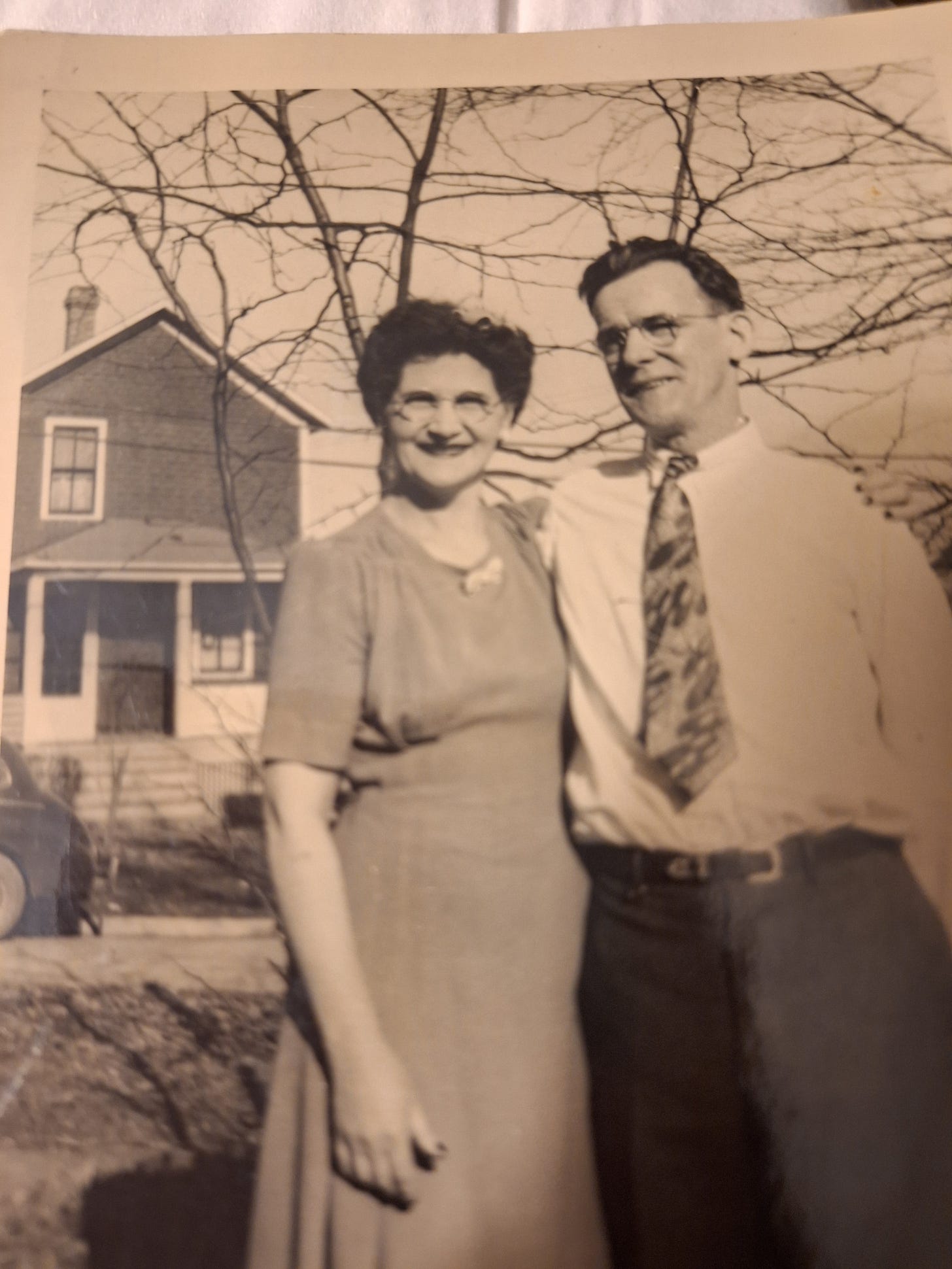Come Saturday mornings, I’d run two blocks down the street I grew up on to my grandmother’s house where I’d help her bake her family-famous bread and sticky rolls. She’d be leaning the kitchen table, her hands already dusted with flour by the time I burst into her tiny kitchen. Her skin was pale and soft looking. When she raised her hands to slap a ball of dough into shape, the flesh that hung from her upper arms looked to me like the dough she was kneading. It was as if she were making food from her own body.
Her face was equally pale, except for the matched spots of rouge on her cheeks and the red lipstick she always wore, even on Saturday mornings.
Mom Mom – my maternal grandmother—was an orphan. Her origins could only be guessed at. I have always thought her plain and resolutely pale features spoke of a Middle European heritage. But when asked, she would describe herself as being of “Pennsylvania Dutch” stock. I’d have guessed Pennsylvanian Hungarian.
Upon arrival in her tiny kitchen, I would scrub my hands then plunge them into the big aluminum bowl where the bread dough lay waiting to be tickled into new life. I’d pull out a bone-white lump and plop it on the flour-dusted, enamel-coated kitchen tabletop, working it into a proper shape. I loved how the dough started off gooey and finger-sticky but soon developed a powdery skin of its own that seemed to eat up the errant scraps from my fingers like a famished animal.
I’d get the dough worked into a great fat sausage shape then hand it to Mom Mom, who would place it carefully into a shallow, well-greased pan where it would eventually transform into her delicious sticky buns.
Meanwhile, maybe half a dozen scorched-by-time bread pans that had been resting atop the stove all night were bulging with the yeasty white bread that brought weekly pleasure to her sons and daughters and grandkids.
One summer Saturday morning, without prompting, she sat down, lit a Pall Mall and told me why she only made white bread. I hadn’t asked. Her words came as a surprise, since we didn’t speak much while we worked.
Dark bread, she told me, was what she had to serve her family during the war. White flour was scarce and therefore expensive. She explained this to me as if reporting a crime, shaking her head at the memory, then falling silent and taking a long draw on her smoke. Serving dark bread to the family that remained after three of her four boys—my uncles—had gone to war tore at her sense of self.
“That bread tasted awful,” she told me.
Her sons akk came home from the war. But not Mom-Mom. The desolate look in her eyes escaped my comprehension back then but I recognize it now. Unbidden, she was telling me her own war story, the story from the homefront. The war denied her one of the great pleasures she treasured as a wife and mother: providing the food her family loved and that she loved to prepare and serve them. It was a tiny example of the much larger anxiety she felt in her sons’ wartime absence, an example of the day-to-day privation that haunted her to the end of her life.
Every slice of Mom-Mom’s bread had character. Each was cratered with tiny air holes and sometimes gaping ones. The light-brown crust baked up cracked and crispy—splintery enough to give your mouth the occasional sharp surprise. Nothing like the store-bought variety, whose crust looked to be painted on, whose body was perfectly smooth, white and tasteless.
However good Mom Mom’s bread tasted just out of the oven, it only got better when, with all the baking finally done, she would shear two slices off a loaf and stuff them into the toaster.
When that toast popped, singed black at its edges from touching the toaster’s coils, Mom Mom would fish a jar of Welch’s Grape Jelly out of the pantry and slather it on the hard golden-brown slab for me. She’d scrape a square of oleomargarine (butter being dear) on her slice, then pour a tall glass of cold whole milk (there being no other kind) for me and a cup of fresh black coffee for herself. Together we’d sit at the kitchen table, spent and happy from our labors, eager for renewal.
Mom Mom would sit across from me at the kitchen table, coffee cup in her right hand, Pall Mall in her left, her head tilted, bird-like, to one side as she watched me eat the bread we’d just made together.
“How is it?” she’d ask.
I’d like to report that I told her the truth—that it was the best bread I’d ever eaten in my life. That making bread with her was even better than Saturday morning cartoons. And that I loved her for treating me like a grown-up and not just a kid.
But I was just a kid. So all I ever said was “Good.”
She’d smile, nod her head and take another drag on her smoke.
.





Sweet
So good! And oh, that Pall Mall!